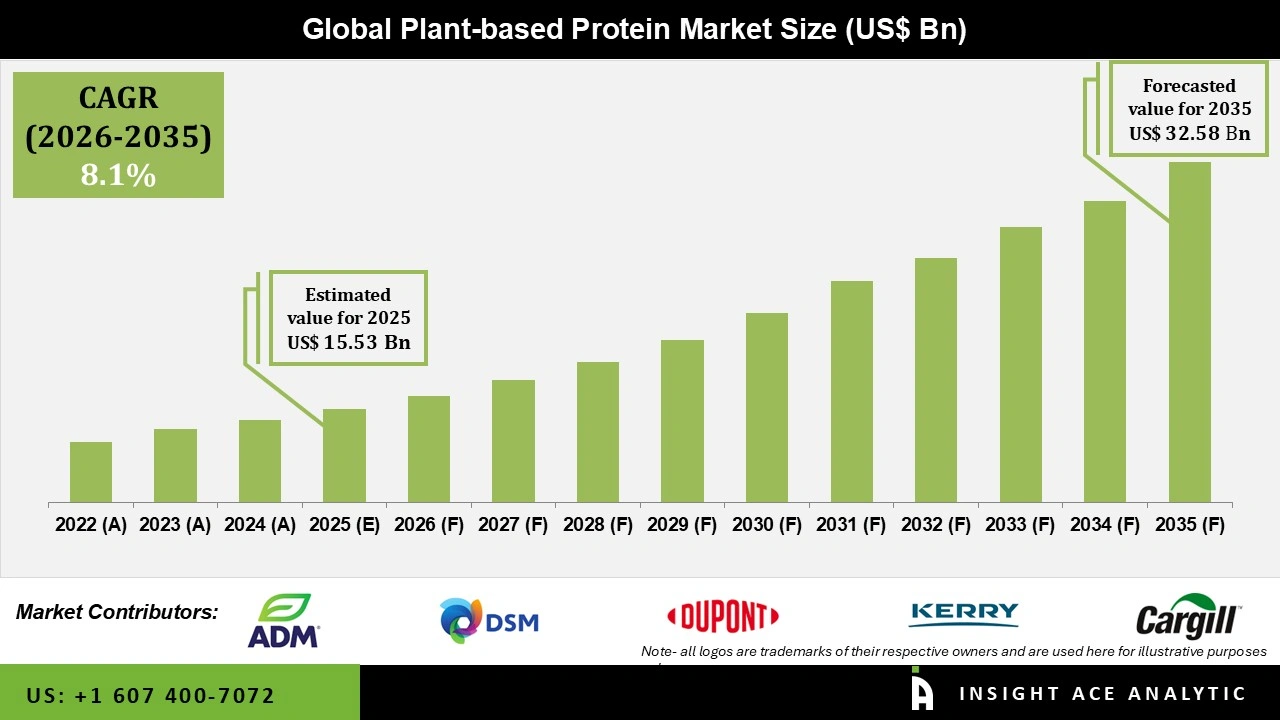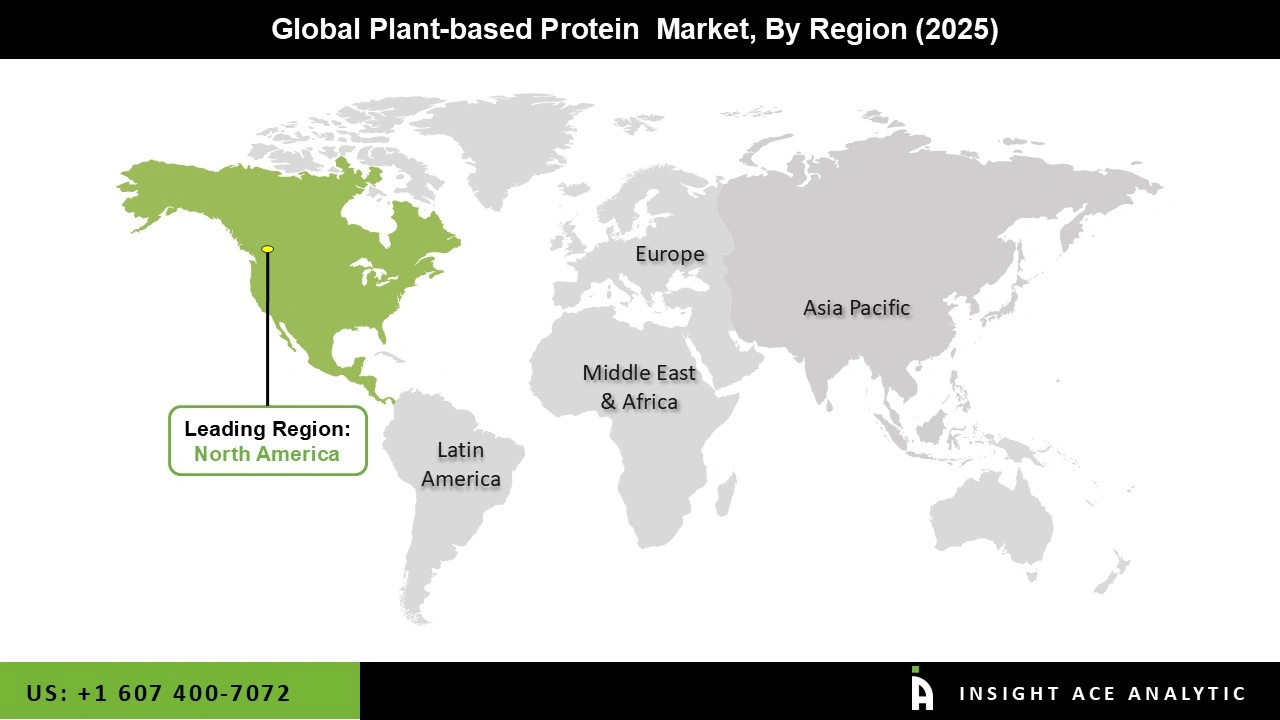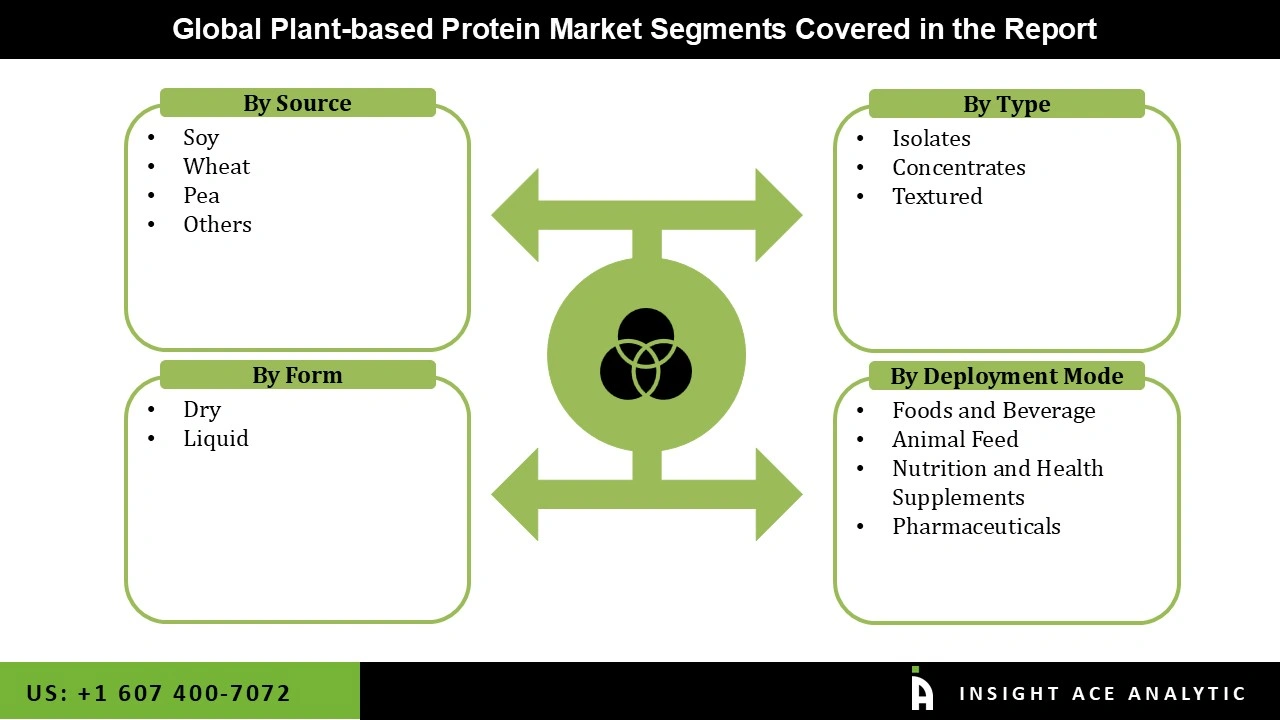Global Plant-based Protein Market Size is valued at USD 15.53 Billion in 2025 and is predicted to reach USD 32.58 Billion by the year 2035 at an 8.10% CAGR during the forecast period for 2026 to 2035.
Plant-based Protein Market Size, Share & Trends Analysis Report By Source (Soy, Wheat, Pea, Others), By Type (Isolates, Concentrates, Textured), By Form (Dry, Liquid), By Deployment Mode, By Region, And By Segment Forecasts, 2026 to 2035

Protein is a vital nutrient used for maintaining muscles and bones, as well as supporting the immune system, among other things. Plant-based diets offer a diversity of health benefits, including healthy weight, optimal health, and longevity. The amino acids within the protein are used to build and repair tissues necessary for infants and children's normal growth and development. Plant-based dietary patterns feature a widespread range of dietary regimens that are predominantly based on plant foods. Plant-based protein sources include soy, wheat, Pea, and other plant sources. Plant protein is low in saturated fat and cholesterol and is a good source of unsaturated fat, fibers, vitamins, and minerals.
At present times, people have started to pay more attention to their diet and health since the coronavirus outbreak. The Plant-Based Foods Association (PBFA) accounted for all plant-based sales during the third week of March, the beginning of most shutdowns in the U.S., was up 90% compared with the previous year, and still 27% higher a month later.
Growing consumption of plant-based food due to naturally occurring fibers, anti-inflammatory micronutrients, antioxidants, lower calorie counts, and increasing demand for high-protein content products are mainly driving the market growth. The rising consumer awareness about the health benefits of plant-based foods is further accelerating the market's growth. Growing demand for fat-free and low-fat protein sources along with an emerging shift towards food patterns to a more plant-based diet, is anticipated to show significant growth during the forecast period.
The Global Plant-based Protein market is categorized on the basis of Source, Type, Form and Application, and region. On the basis of Source, the market is segmented into Soy, Wheat, Pea, and Others. On the basis of Type, the market is segmented into Isolates, Concentrates, and Textured. Based on Form, the market is categorized into Dry and Liquid. Based on Application, the market is categorized into Foods and Beverage, Animal Feed, Nutrition and Health Supplements, and Pharmaceuticals. Based on region, the market is studied across North America, Asia-Pacific, Europe, and LAMEA. On the other hand, Asia-Pacific is expected to dominate the market during the analysis of the forecast period.

| Report Attribute | Specifications |
| Market Size Value In 2025 | USD 15.53 Billion |
| Revenue Forecast In 2035 | USD 32.58 Billion |
| Growth Rate CAGR | CAGR of 8.10% from 2026 to 2035 |
| Quantitative Units | Representation of revenue in US$ Bn, and CAGR from 2026 to 2035 |
| Historic Year | 2022 to 2025 |
| Forecast Year | 2026-2035 |
| Report Coverage | The forecast of revenue, the position of the company, the competitive market structure, growth prospects, and trends |
| Segments Covered | By Source, By Type, By Form, By Deployment Mode |
| Regional Scope | North America; Europe; Asia Pacific; Latin America; Middle East & Africa |
| Country Scope | U.S.; Canada; U.K.; Germany; China; India; Japan; Brazil; Mexico ;The UK; France; Italy; Spain; China; Japan; India; South Korea; South East Asia; South Korea; South East Asia |
| Competitive Landscape | Archer Daniels Midland Company , DSM, E.I. Dupont De Nemours and Company , Kerry Group , Cargill Inc., Glanbia plc., Wilmar International , Emsland Group , Puris , Cosucra Group, AMCO Proteins Company , Batory Foods , Roquette Freres , Ingredion Inc., Burcon Nutracience , Sotexpro, AGT Food & Ingredients , Beneo , Prolupin Gmbh , Aminola , Herblink Biotech Corporation , ET Chem , Shandong Jianyuan Group , The Greenlans LLC , Parabel , Corbion NV, Danone, Farbest Brands, Axiom Foods Inc. , NOW Foods , Tate & Lyle Plc, Crespel & Deiters GmbH & Co. KG, CHS Inc., and Other Prominent Players |
| Customization Scope | Free customization report with the procurement of the report, Modifications to the regional and segment scope. Particular Geographic competitive landscape. |
| Pricing And Available Payment Methods | Explore pricing alternatives that are customized to your particular study requirements. |

This study employed a multi-step, mixed-method research approach that integrates:
This approach ensures a balanced and validated understanding of both macro- and micro-level market factors influencing the market.
Secondary research for this study involved the collection, review, and analysis of publicly available and paid data sources to build the initial fact base, understand historical market behaviour, identify data gaps, and refine the hypotheses for primary research.
Secondary data for the market study was gathered from multiple credible sources, including:
These sources were used to compile historical data, market volumes/prices, industry trends, technological developments, and competitive insights.

Primary research was conducted to validate secondary data, understand real-time market dynamics, capture price points and adoption trends, and verify the assumptions used in the market modelling.
Primary interviews for this study involved:
Interviews were conducted via:
Primary insights were incorporated into demand modelling, pricing analysis, technology evaluation, and market share estimation.
All collected data were processed and normalized to ensure consistency and comparability across regions and time frames.
The data validation process included:
This ensured that the dataset used for modelling was clean, robust, and reliable.
The bottom-up approach involved aggregating segment-level data, such as:
This method was primarily used when detailed micro-level market data were available.

The top-down approach used macro-level indicators:
This approach was used for segments where granular data were limited or inconsistent.
To ensure accuracy, a triangulated hybrid model was used. This included:
This multi-angle validation yielded the final market size.
Market forecasts were developed using a combination of time-series modelling, adoption curve analysis, and driver-based forecasting tools.
Given inherent uncertainties, three scenarios were constructed:
Sensitivity testing was conducted on key variables, including pricing, demand elasticity, and regional adoption.